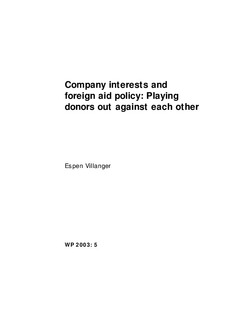| dc.contributor.author | Villanger, Espen | |
| dc.date.accessioned | 2008-02-22T11:41:45Z | |
| dc.date.accessioned | 2017-03-29T09:13:29Z | |
| dc.date.available | 2008-02-22T11:41:45Z | |
| dc.date.available | 2017-03-29T09:13:29Z | |
| dc.date.issued | 2003 | |
| dc.identifier.isbn | 82-8062-051-6 | |
| dc.identifier.issn | 0804-3639 | |
| dc.identifier.uri | http://hdl.handle.net/11250/2436154 | |
| dc.description.abstract | Despite the importance attached to conditionality by the donors, and the fact that aid is a crucial income source for the recipient, it is found that conditionality fails. One explanation for this failure could be that a halt in aid could trigger the recipient to cancel contracts with companies from donor countries, which creates incentives for the companies to put pressure towards aid disbursement. We use a multi-agent triadic model of the relationships between a recipient and two donors and two companies to illustrate that recipients may use contracts strategically to make companies influence the disbursement decision to avoid implementing the donors’ conditions. Failing to take account of the companies’ role yields the opposite result in this model, i.e., conditionality becomes successful. | |
| dc.language.iso | eng | |
| dc.publisher | Chr. Michelsen Institute | |
| dc.relation.ispartofseries | CMI Working paper | |
| dc.relation.ispartofseries | WP 2003: 5 | |
| dc.subject | Triadic | |
| dc.subject | Conditionality | |
| dc.subject | Foreign aid | |
| dc.subject | Foreign assistance | |
| dc.subject | JEL classification: E61, F35 | |
| dc.title | Company interests and foreign aid policy: Playing donors out against each other | |
| dc.type | Working paper | |
